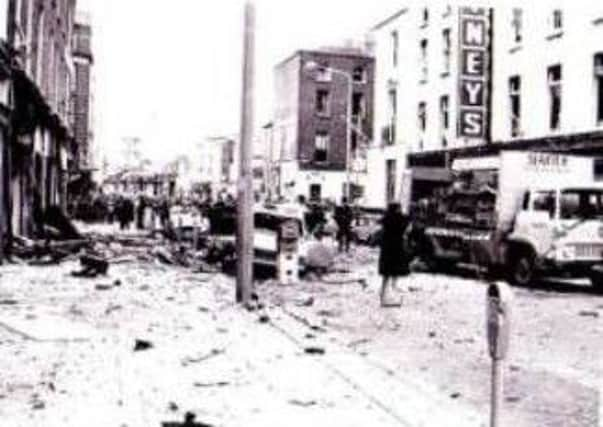Dublin accused of hypocrisy over call to open UK files on 1974 bombings


The call was made on the 42nd anniversary of the Dublin-Monaghan bombings, in which the UVF, allegedly colluding with the UK, killed 33 people.
Irish Foreign Affairs Minister Charlie Flanagan said he would continue to demand the UK open its police files on the 1974 atrocity.
Advertisement
Hide AdAdvertisement
Hide Ad“The government will continue to actively pursue this objective, and we have made it a commitment in the new programme for government,” he said.
A wreath-laying ceremony by relatives of those killed in the bombings took place in Dublin on Tuesday. Irish President Michael D Higgins has also called on the UK to open its files.
Mr Flanagan said the Irish government has worked consistently to implement all-party parliamentary motions which call on Britain to allow access to related files by an independent judicial figure.
Sinn Fein president Gerry Adams agreed. “It is vital that the new government lives up to the need to ensure the utmost pressure is put on the British administration to release their files,” he said.
Advertisement
Hide AdAdvertisement
Hide AdBut DUP MLA William Irwin said such comments from Dublin “singularly ignore the collusion that took place within the Republic of Ireland and the refusal by authorities there to recognise it”.
He added: “Records show the role Dublin played in forming the Provisional IRA and Irish ministers admitted that training was given to the Provisionals ‘with the knowledge of the whole government’.”
He also highlighted the “reluctance” by Dublin to hand over Garda files to the Kingsmills massacre inquest – the IRA attack having been executed from Co Louth; Dublin’s acts of omission allowed terrorists “to operate freely” in the Republic, he said.
The MLA slammed the Taoiseach for refusing to meet the family of Ian Sproule, who was murdered in 1991 after the Garda allegedly passed its own file on him to the IRA.
Advertisement
Hide AdAdvertisement
Hide AdUUP leader Mike Nesbitt said the Irish government “may feel they are on safe ground promising to push London to release all relevant documents concerning Dublin-Monaghan”.
However, Dublin caused “much anger”, he said, when gardai ran an official investigation into the shooting of Sinn Fein activist Aidan McAnespie by a British soldier in 1988, but then refused to give the report to his family.
Mr Nesbitt also slammed Mr Adams for continuing to deny he was a member of the IRA – and the “immense hurt and damage that organisation continues to cause through its refusal to disband and hand over their collective knowledge concerning their terror campaign”.
Victims campaigner Willie Frazer called for the same international judge to have access to all files about “the Dublin government’s role” in forming, arming and training the IRA. “They can’t have their cake and eat it,” he said.
Advertisement
Hide AdAdvertisement
Hide AdThe Garda file on the Kingsmills massacre promised by the Taoiseach is so thin that they either ignored the IRA on the border – or hid their files from us, he added.
Innocent Victims United spokesman Kenny Donaldson said: “We support the Dublin and Monaghan families in their quest to secure justice, truth and accountability.”
If appointed, this international judge should also examine the Irish cabinet’s role in creating the Provisional IRA and a plethora of border cases where intelligence links the Irish defence forces with the IRA, he added.
Dr Cillian McGrattan, lecturer in politics at Ulster University, said Dublin’s “contradictory attitude” towards the past raises serious questions about it as an honest broker.
Advertisement
Hide AdAdvertisement
Hide Ad“Unlike London, Dublin refused to promise ‘full disclosure’ on the role of the Irish state in the Troubles in the Stormont House Agreement,” he said.
“By withholding files while at the same time demanding inquiries about specific atrocities, the Irish government appears as disingenuous.”
In February a Church of Ireland cleric challenged an Irish diplomat on the issue of Dublin’s transparency on the past during a question and answer session at a victims’ conference in Enniskillen.
Rev Alan Irwin, who lost his father and uncle in the Enniskillen bombing, asked him: “what hope is there for true reconciliation and trust when the Irish government cannot acknowledge their role in the formation of the Provisional IRA out of the Official IRA in 1969?”
Advertisement
Hide AdAdvertisement
Hide AdThe cleric also said that the Taoiseach had refused to apologise to the Kingsmills families for Gardai failure to clamp down on the IRA during the Troubles, while the UK Prime Minister had apologised for UK collusion in the murder of solicitor Pat Finucane.
Ruairi De Burca, Irish Joint Secretary to the British Irish Secretariat, replied that it would be for academics - not international judges - to probe Irish government files about the origins of the IRA.
“There is a lot in what you say,” he told the cleric. “What is in the [Stormont House] agreement is a very definite commitment that the governments - both governments - would make statements of acknowledgement, but on the basis of facts determined by independent academic experts and I would not want to prejudge that work.
“I have heard what you said about the formation of the provisional IRA. I was two at the time so I am not in a position to argue the rights and the wrongs of it - who did what and when - It is too long ago.”